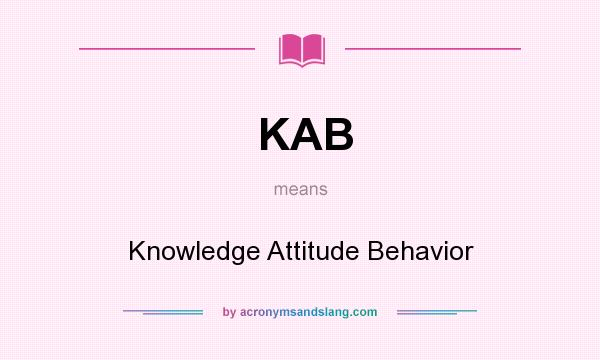What does KAB mean?
KAB means Knowledge Attitude Behavior
This acronym/slang usually belongs to Undefined category.
What is the abbreviation for Knowledge Attitude Behavior?
Knowledge Attitude Behavior can be abbreviated as KAB

|
|
Most popular questions people look for before coming to this page
| Q: A: |
What does KAB stand for? KAB stands for "Knowledge Attitude Behavior". |
| Q: A: |
How to abbreviate "Knowledge Attitude Behavior"? "Knowledge Attitude Behavior" can be abbreviated as KAB. |
| Q: A: |
What is the meaning of KAB abbreviation? The meaning of KAB abbreviation is "Knowledge Attitude Behavior". |
| Q: A: |
What is KAB abbreviation? One of the definitions of KAB is "Knowledge Attitude Behavior". |
| Q: A: |
What does KAB mean? KAB as abbreviation means "Knowledge Attitude Behavior". |
| Q: A: |
What is shorthand of Knowledge Attitude Behavior? The most common shorthand of "Knowledge Attitude Behavior" is KAB. |
Abbreviations or Slang with similar meaning
- AKAP - Awareness, Knowledge, Attitude, Practice
- KAP - Knowledge, Attitude and Practice
- KASH - Knowledge Attitude Skills Habits
- ABP - Attitude Behavior and Practice
- ASK - Attitude Skills Knowledge
- KABC - Knowledge Attitude Behaviour Change
- KABP - Knowledge Attitude Behaviour Practice
- KAP - knowledge, attitude and practise
- KAS - Knowledge Attitude Skills
- KASE-AQ - Knowledge, Attitude, and Self-Efficacy Asthma Questionnaire
- SKA - Skills Knowledge Attitude
- BATH - Behavior, Attitude, Thinking and Habits
- kab - Knowledge, Attitude and Behaviour
- kabp - Knowledge, Attitude, Behavior and Practice
- ksa - Knowledge-skill-attitude
- ABC - Attitude Behavior Consistency
- KAS - Knowledge, Attitude, Skills. The constituents required for people to succeed at what they do, individually and collectively. Knowledge and Skills can largely be trained; Attitude can't - it's a factor of personality, emotion, personal circumstances, and t
- KASH - Knowledge, Attitude, Skills, Habits. Another useful acronym for trainers to explain different aspects of learning. Generally skills and knowledge are easier to develop and change than attitude and habits. (Ack SD) If you know the origins of the KASH acron
- BIKASH - Building in Knowledge Attitude and Skills for Health
- BIKASH - Building In Knowledge Attitude Skills for Health